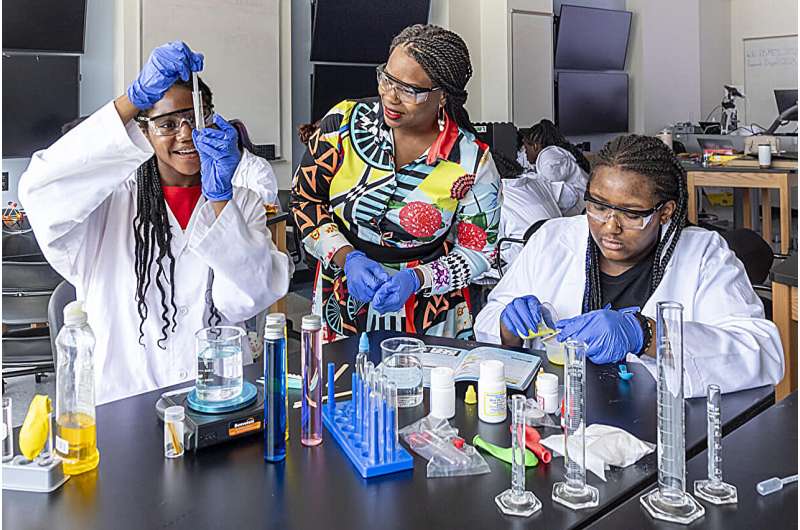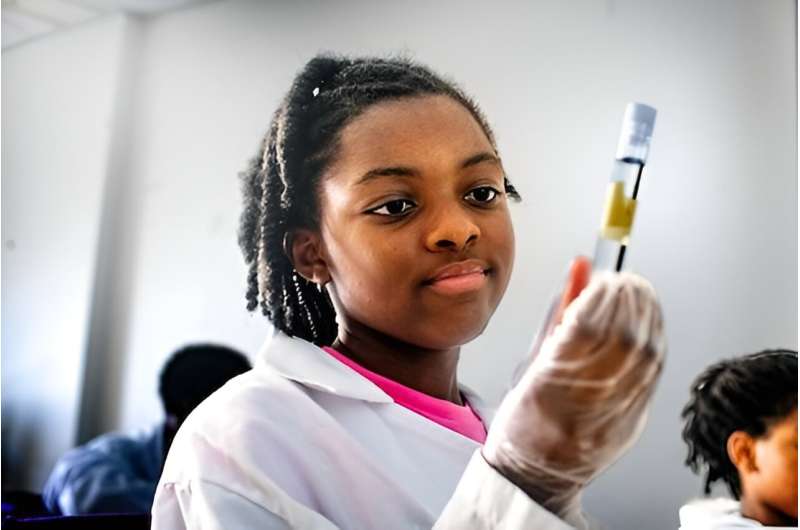This article has been reviewed according to Science X's editorial process and policies. Editors have highlighted the following attributes while ensuring the content's credibility:
fact-checked
trusted source
proofread
STEM program for middle- and high-school girls inspires brilliance

In a classroom on Georgia State's Atlanta Campus, more than a dozen middle and high school girls are wearing lab coats and peering into test tubes. They're conducting an epidemiology experiment—the study of how diseases are spread. It's just one of the lessons the campers will master this summer. This is I AM STEM Camp.
I AM STEM, focused on expanding access to science, technology, engineering and math, is the brainchild of researcher Natalie King, an associate professor of science education in Georgia State's College of Education & Human Development. On any given day, campers might learn about public health, physics or how to build a mini solar panel—all before 3 p.m.
Laila Vickerson is an 11-year-old who says she loves learning about science.
"This is my first year of camp and every day we're trying new things," says the rising seventh-grader. "It's exciting to try experiments that connect to science in the real world."
Vickerson says she wants to be a veterinarian because she loves animals. She is one of dozens of students taking part in the camp to encourage what King calls "Black girl brilliance."

Black girl brilliance
"Black girls are brilliant and develop identities in unique ways that are often defined within the context of traditional schools," says King. "My scholarship seeks to explore their lives beyond school and to uplift their stories because Black girls are not a monolith. Knowing that identity development is dynamic, fluid and contextual, I hope to create spaces where they can thrive and show up as their full, authentic selves."
The program explores the ways Black girls develop positive STEM identities while they go through middle and high school.
"We are conducting a longitudinal study to follow the girls as they matriculate into and through middle school, and then into and through high school, so they can author their own stories. We create rich STEM learning environments and bring them to college campuses to support this positive STEM identity development," King says.
Many of the students return to camp year after year because of the friends they make and the lessons they learn. King says it's important for campers to have a space that is culturally sustaining to learn and develop their own STEM identities. As part of the program, King and colleagues recently published a study in the journal Education Sciences that offers insight into how educators can support students as they cultivate that identity.
In 2023, King received the Alan T. Waterman Award, the nation's highest honor for early-career scientists and engineers. The prize recognizes King's innovative work in STEM education.
Preparing for the future
King and her team have partnered with the Atlanta area chapter of Girls Inc., Ivy Preparatory Academy, and the Boys and Girls Clubs of Metro Atlanta. This is King's 13th year facilitating summer STEM camps. She founded I AM STEM in 2017 and has been offering STEM Camps on Georgia State's campus since 2022.
This year, campers traveled to Washington, D.C., to share their research project results with a group of female STEM leaders at the STEMNoire Conference. Their self-chosen youth participatory action research projects included helping the unhoused population near campus, creating community gardens in food deserts, and creating awareness about female health and hygiene.
Stephanie Banner is a project facilitator for Girls Inc. of Greater Atlanta. This is her first year working with the campers and says she's witnessed tremendous growth because of the program.
"Each day, these young ladies are getting such wonderful opportunities to learn. They are being inspired, and this is surely a formative experience for many of them," Banner says.
Using Georgia State's downtown campus as a homebase, campers take field trips to destinations like the David J. Sencer CDC Museum, the Delta Flight Museum and the Flowers Invention Studio at Georgia Tech. It's experiences like these, says King, that will help prepare students for the future.
According to the NSF's National Center for Science and Engineering Statistics, women have made inroads in the past decade but the number of Black women in STEM careers continues to lag behind. King says the career outlook for these students is important, but it's not the only goal.
"My vision is that we no longer define STEM success solely through the lens of workforce development," says King. "But also, how Black girls leverage the STEM disciplines to freedom-dream, be creative problem-solvers and exercise agency."
Mi'Kayla Newell is one of several doctoral students who works with King to develop the program and facilitate the activities. The Ph.D. student in educational psychology with Georgia State's College of Education says exposing the students to STEM is truly rewarding.
"You can literally see their faces light up when they find something they enjoy and say, 'This is STEM?'" says Newell. "Equally important is the mentorship we receive in King's Research Collaborative. There are many stories to be told in the work that Dr. King does. Her impact extends beyond what meets the eye."
This year's camp concludes with a field day activity and awards for the participants. Now King will continue to follow the campers' progress as they complete high school and decide what colleges and career paths they want to pursue—some of which, King says, don't even exist yet.
"We're making inroads, but not at the rate at which technology is advancing," says King. "What's challenging is that now we must prepare children for jobs that don't yet exist. We have to provide innovative spaces so that they can think critically to generate solutions to problems and answers to questions in their careers and daily lives."
According to the Pew Research Center, the prospects for diversity in the STEM labor force are strongly tied to representation in STEM programs, especially in the country's colleges and universities. King says this is where the opportunities lie.
"My hope is that the girls will be exposed to new ideas and opportunities, and that they will be mentored by and in close proximity to STEM professionals and researchers," King says. "Sustained participation will only occur if they see the value in and relevance of the programs that we offer … where they are safe, protected, seen, heard and loved."
More information: Natalie S. King et al, "The Work I Do Matters": Cultivating a STEM Counterspace for Black Girls through Social-Emotional Development and Culturally Sustaining Pedagogies, Education Sciences (2023). DOI: 10.3390/educsci13070754
Provided by Georgia State University





















